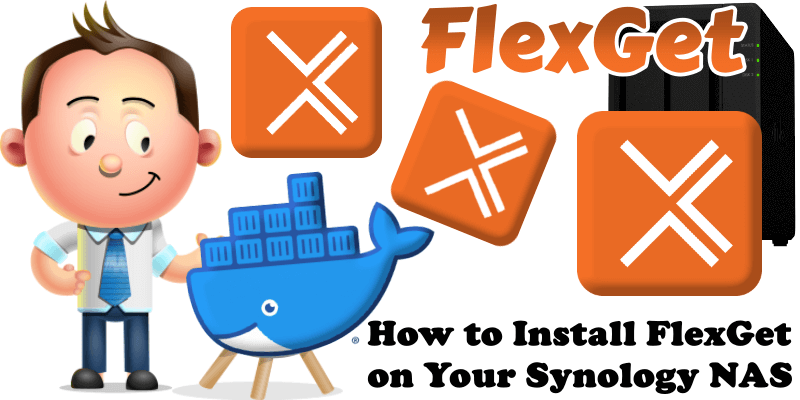
FlexGet is a multipurpose automation tool for content like torrents, NZBs, podcasts, comics, series, movies, etc. It can use different kinds of sources like RSS-feeds, html pages, csv files, search engines and there are even plugins for sites that do not provide any kind of useful feeds. In this step by step guide I will show you how to install FlexGet on your Synology NAS using Docker & Portainer.
STEP 1
Please Support My work by Making a Donation.
STEP 2
Install Portainer using my step by step guide. If you already have Portainer installed on your Synology NAS, skip this STEP. Attention: Make sure you have installed the latest Portainer version.
STEP 3
Go to File Station and open the docker folder. Inside the docker folder, create one new folder and name it flexget. Follow the instructions in the image below.
Note: Be careful to enter only lowercase, not uppercase letters.
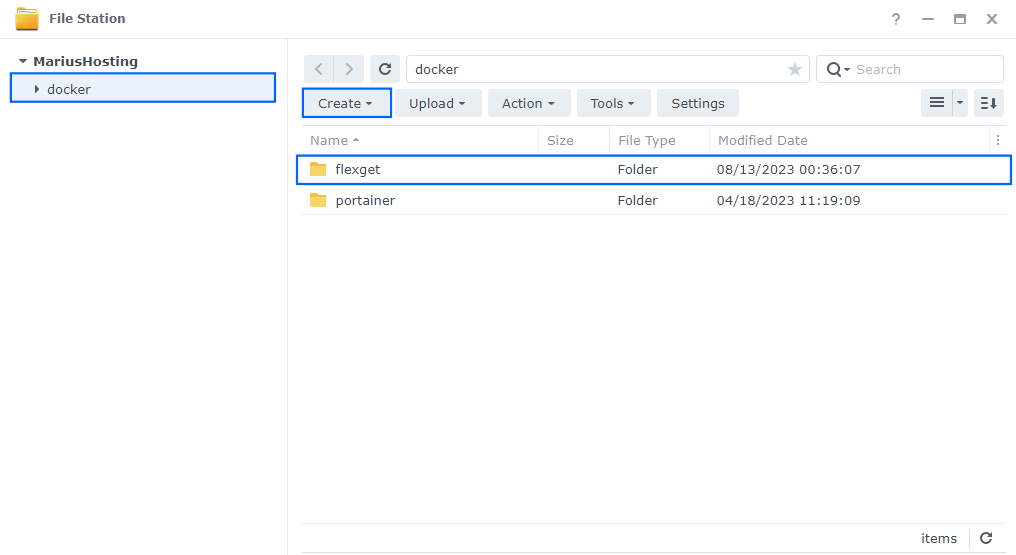
STEP 4
Now create two new folders inside the flexget folder that you created at STEP 3 and them config and data. Follow the instructions in the image below.
Note: Be careful to enter only lowercase, not uppercase letters.
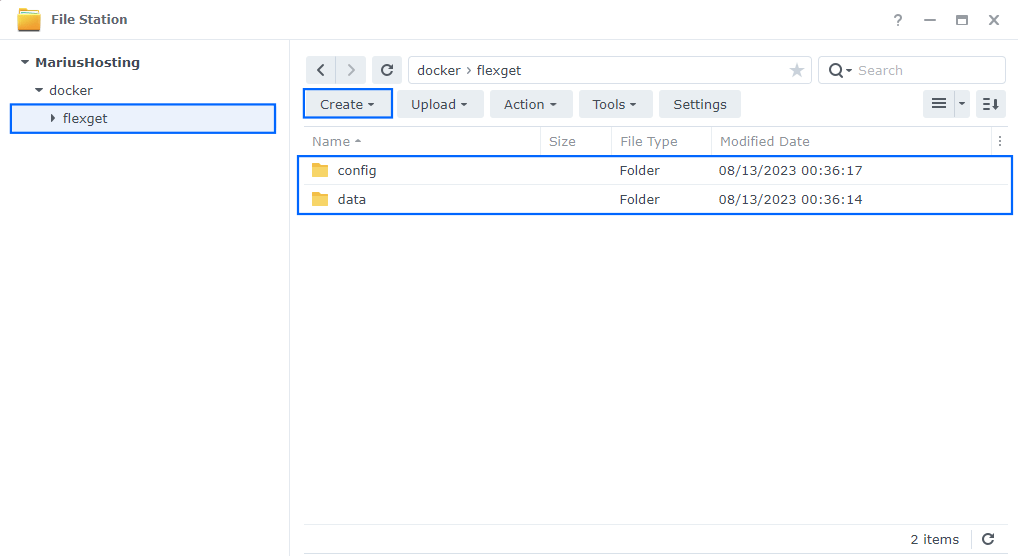
STEP 5
Log into Portainer using your username and password. On the left sidebar in Portainer, click on Home then Live connect. Follow the instructions in the image below.

On the left sidebar in Portainer, click on Stacks then + Add stack. Follow the instructions in the image below.

STEP 6
In the Name field type in flexget. Follow the instructions in the image below.
services:
flexget:
image: ghcr.io/linuxserver/flexget:latest
container_name: FlexGet
hostname: flexget
mem_limit: 2g
cpu_shares: 768
security_opt:
- no-new-privileges:true
healthcheck:
test: wget --no-verbose --tries=1 --spider http://localhost:5050
ports:
- 8650:5050
volumes:
- /volume1/docker/flexget/config:/config:rw
- /volume1/docker/flexget/data:/data:rw
environment:
TZ: Europe/Bucharest
PUID: 1026
PGID: 100
FG_LOG_LEVEL: info
FG_LOG_FILE: /config/flexget.log
FG_CONFIG_FILE: /config/.flexget/config.yml
FG_WEBUI_PASSWORD: mariushostingSTRONGPassWoRd@
restart: on-failure:5
Note: Before you paste the code above in the Web editor area below, change the value for TZ. (Select your current Time Zone from this list.)
Note: Before you paste the code above in the Web editor area below, change the value numbers for PUID and PGID with your own values. (Follow my step by step guide on how to do this.)
Note: Before you paste the code above in the Web editor area below, change the value for FG_WEBUI_PASSWORD and type in your own password. mariushostingSTRONGPassWoRd@ is an example for a password. You will need this password later at STEP 10.
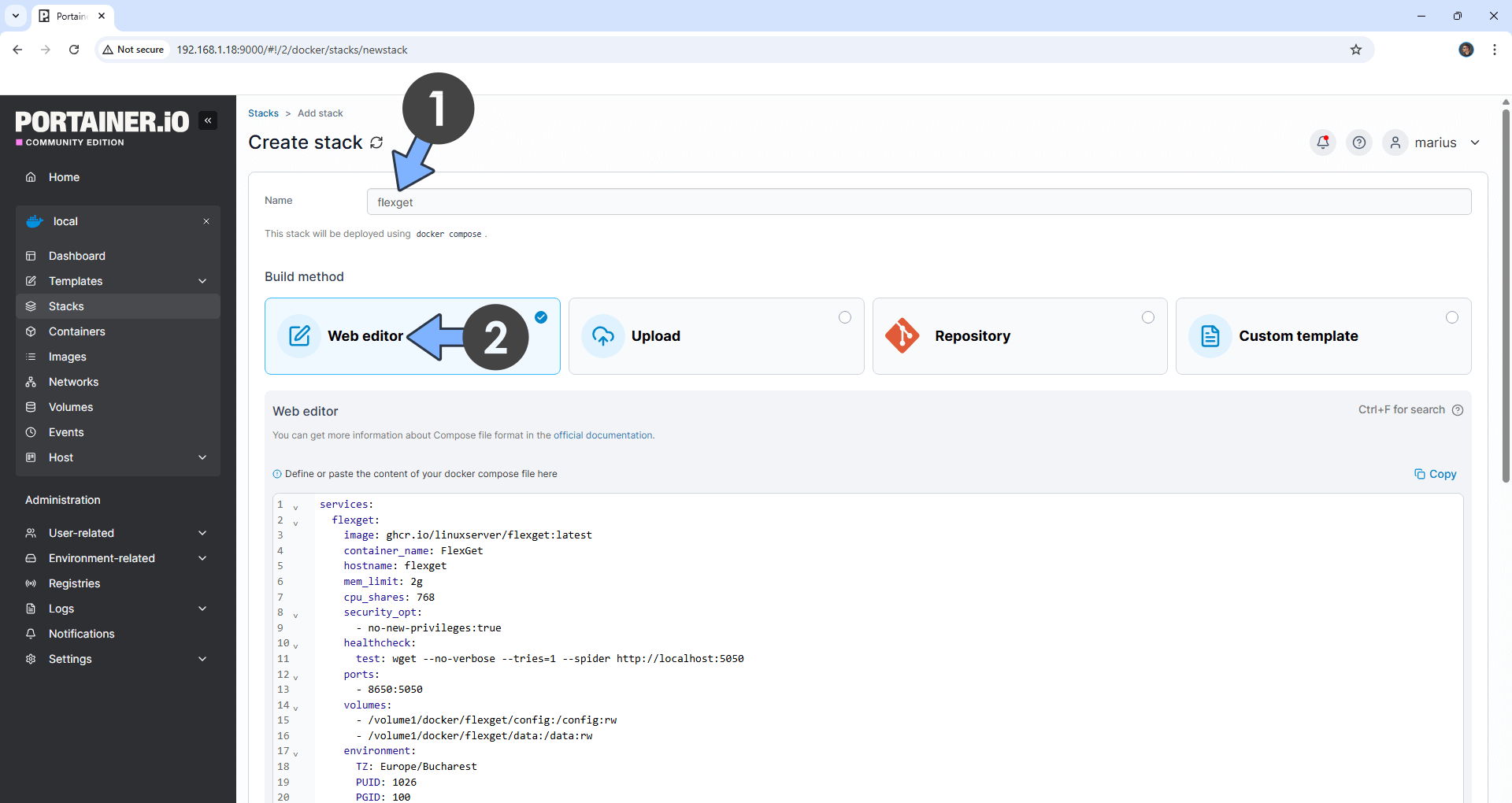
STEP 7
Scroll down on the page until you see a button named Deploy the stack. Click on it. Follow the instructions in the image below. The installation process can take up to a few minutes. It will depend on your Internet speed connection.
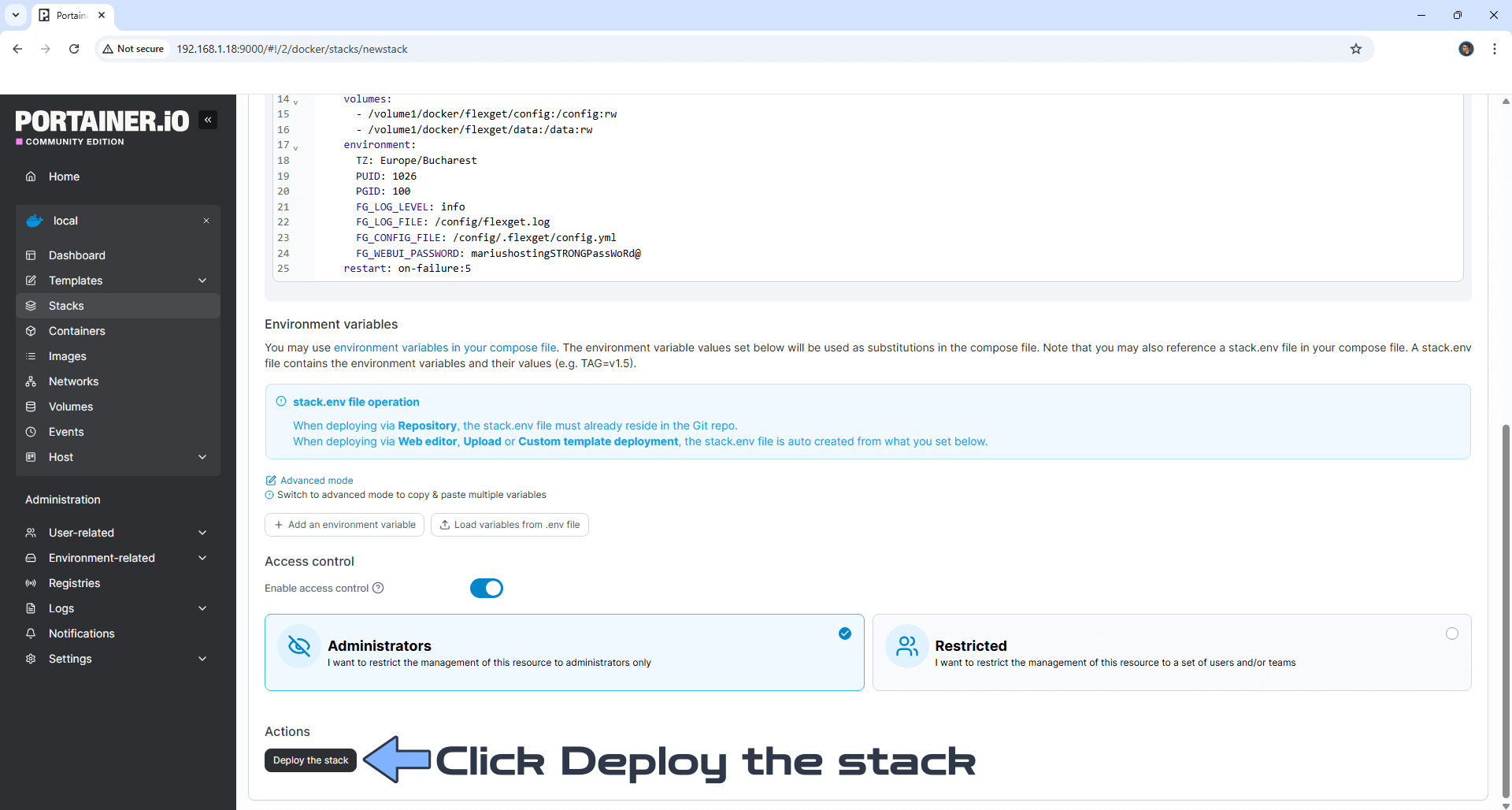
STEP 8
If everything goes right, you will see the following message at the top right of your screen: “Success Stack successfully deployed“.

STEP 9
🟢Please Support My work by Making a Donation. Almost 99,9% of the people that install something using my guides forget to support my work, or just ignore STEP 1. I’ve been very honest about this aspect of my work since the beginning: I don’t run any ADS, I don’t require subscriptions, paid or otherwise, I don’t collect IPs, emails, and I don’t have any referral links from Amazon or other merchants. I also don’t have any POP-UPs or COOKIES. I have repeatedly been told over the years how much I have contributed to the community. It’s something I love doing and have been honest about my passion since the beginning. But I also Need The Community to Support me Back to be able to continue doing this work.
STEP 10
The installation process can take up to a few seconds/minutes. It will depend on your Internet speed connection. Now open your browser and type in http://Synology-ip-address:8650 Type in the default Username which is flexget and your own password that you have previously added at STEP 6. Click LOGIN. Follow the instructions in the image below.
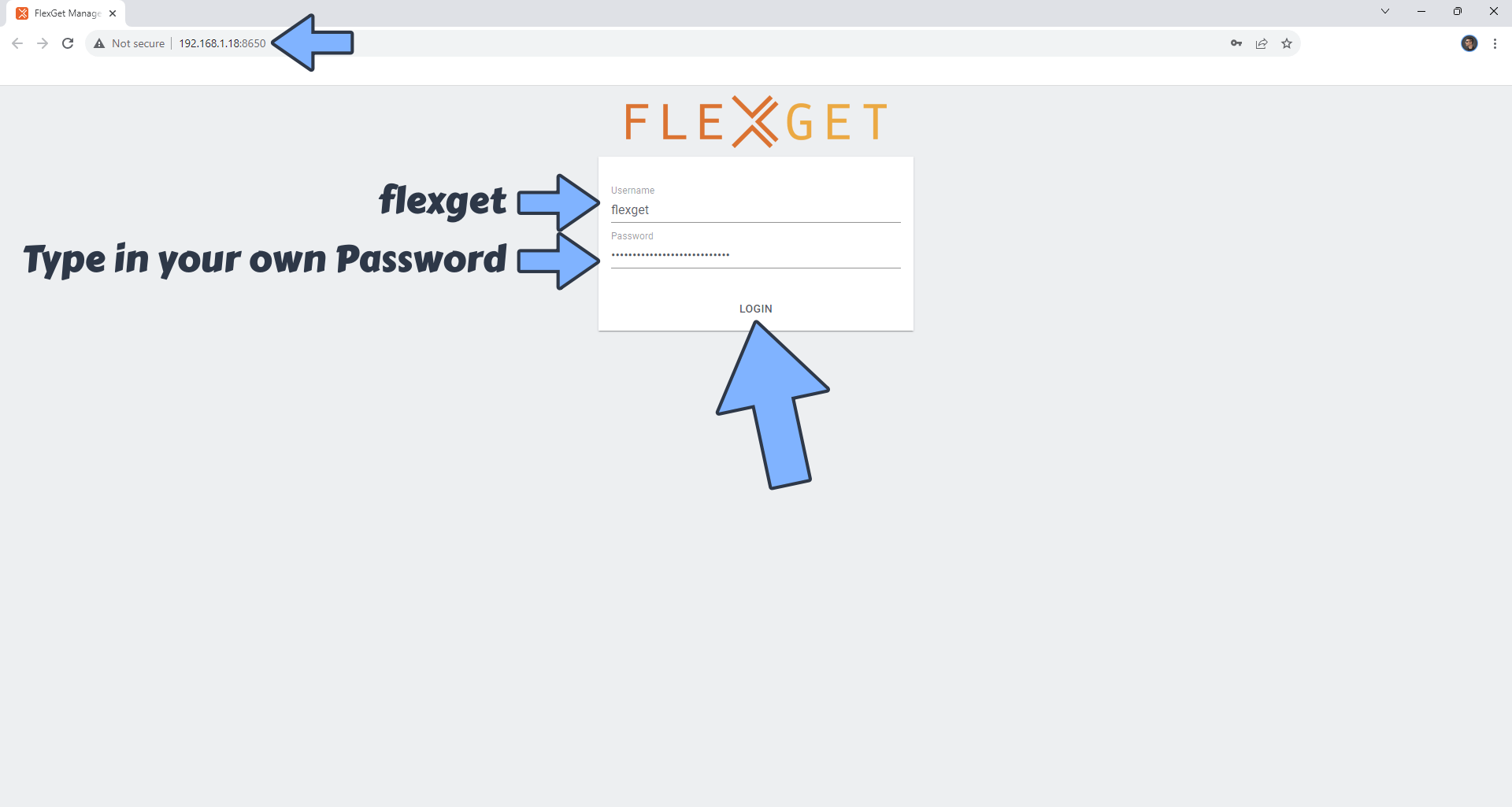
STEP 11
Your FlexGet Dashboard at a glance!
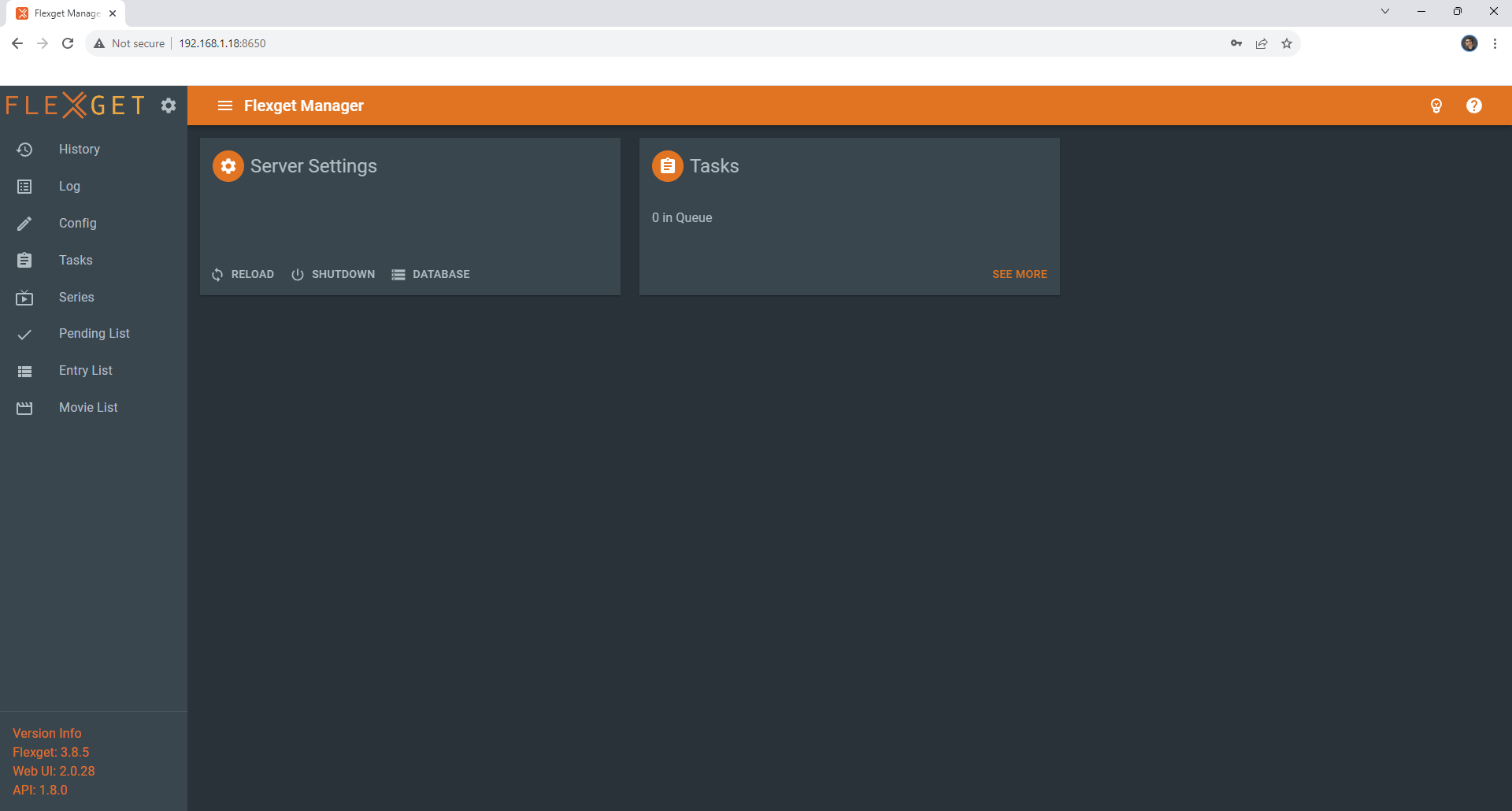
Enjoy FlexGet!
Note: FlexGet Full Official Documentation.
If you encounter issues by using this container, make sure to check out the Common Docker issues article.
Note: If you want to run the FlexGet container over HTTPS, check How to Run Docker Containers Over HTTPS. In order to make FlexGet work via HTTPS, it’s mandatory to activate WebSocket.
Note: Can I run Docker on my Synology NAS? See the supported models.
Note: How to Back Up Docker Containers on your Synology NAS.
Note: Find out how to update the FlexGet container with the latest image.
Note: How to Free Disk Space on Your NAS if You Run Docker.
Note: How to Schedule Start & Stop For Docker Containers.
Note: How to Activate Email Notifications.
Note: How to Add Access Control Profile on Your NAS.
Note: How to Change Docker Containers Restart Policy.
Note: How to Use Docker Containers With VPN.
Note: Convert Docker Run Into Docker Compose.
Note: How to Clean Docker.
Note: How to Clean Docker Automatically.
Note: Best Practices When Using Docker and DDNS.
Note: Some Docker Containers Need WebSocket.
Note: Find out the Best NAS Models For Docker.
Note: Activate Gmail SMTP For Docker Containers.
This post was updated on Sunday / January 18th, 2026 at 11:34 AM
